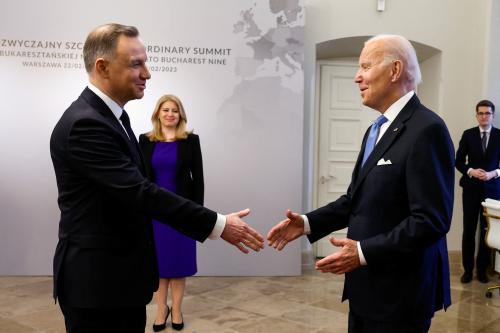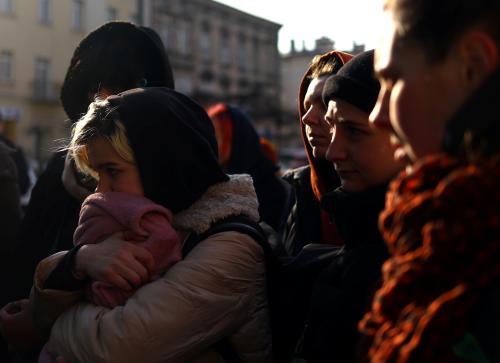As a key supporter of Ukraine, the largest post-communist country in the European Union, and a staunch U.S. ally, Poland’s October 15 parliamentary elections will have far-reaching consequences. Poles will choose between four more years of a populist government accused of several violations of the rule of law, undermining the EU, and xenophobic policies since it first came to office in 2015, or its long-standing opposition, and the chance for Poland to restore its democratic institutions and its international reputation. Regardless of the outcome, Polish politics will remain polarized.
The incumbent Law and Justice party (Prawo i Sprawiedliwość, PiS) gained power in 2015 on promises of “good change” and appeals to moderation. Its controversial chair, Jarosław Kaczyński, the country’s prime minister from 2006 to 2007, did not run for a leadership position, relying instead on more palatable proxies. It was only after PiS gained power that the party suborned the judiciary, used government media as a propaganda mouthpiece while limiting the free media, and eroded independent institutions of monitoring, oversight, and accountability. It has also built a loyal constituency of older, more rural, more conservative voters that brought the party to power in 2015 and reelected it in 2019.
The campaign
The electoral gap has narrowed between PiS and the opposition Civic Coalition (Koalicja Obywatelska, KO), led by Donald Tusk, prime minister from 2007 to 2014 and president of the European Council in Brussels from 2014 to 2019. PiS has been polling around 36%; KO around 30%. Other players include Confederation (Konfederacja), an economically libertarian and politically conservative party aimed at young voters; the Third Way (Trzecia Droga) coalition, made up of the Peasants Party and a movement led by a television celebrity; and the New Left (Nowa Lewica), a coalition of left-wing parties. The hundreds of thousands of supporters marching in the huge opposition demonstration in Warsaw on October 1 was a show of opposition strength — and utterly ignored by the state media.
So far, PiS has used strategies familiar from previous elections: giving retirees extra pension payments, increasing subsidies for children by 60%, lowering gas prices to the point that wholesale prices are higher than those in gas stations, and attacking its rivals as un-Polish, traitorous, and for “punishing children for praying in Polish.”
These may not be enough: Despite many popular policies and the party’s support for Ukraine, PiS faces a demographic problem. Its electorate is overwhelmingly elderly and may be dying off. Inflation and a worsened economic situation may also lead many of its voters to stay at home. Voter mobilization is crucial, since most voters are already loyal to either the government or the opposition.
To mobilize this electorate and ensure its victory, PiS has pursued three additional tactics.
The first is doubling down on popular policies. Despite having signed off in June on the EU’s new migration pact — which aims to create a fairer distribution of asylum-seekers and (at least according to critics) reduces overall protections for them, the party has now announced its opposition to it. It is counting on a repeat of 2015, when the party’s hostility to the wave of immigrants then arriving in Europe was seen as instrumental to its victory. PiS representatives have also been traveling to small cities and highlighting local investments (most of which are funded by the EU).
The second, and least effective, was a new bill that would investigate “Russian influence” in Polish politics and bar those found guilty from politics, a thinly-veiled attack on the opposition. The bill, rife with legal contradictions and vague specifications, was immediately ridiculed and has foundered since.
Third, the party announced in mid-August that the October ballot would also include a four-question referendum: with leading questions on the sale of state enterprises, raising the retirement age, supporting “the admission of thousands of illegal immigrants from the Middle East and Africa,” and removing the wall on the border with Belarus. The idea is to transform anger into turnout.
The opposition, for its part, has decided to focus on substantive alternatives — in the case of KO, exactly 100. The party is mobilizing women by declaring abortion, in vitro fertilization, and contraception to be fundamental rights, especially important after a near-total ban in 2021. Other policy ideas include simplifying gender self-identification, and civil partnerships for same-sex couples (almost two-thirds of Poles favor the latter). The left has also pursued a similar course, proposing to expand the definition of rape and giving women menstrual leave from work. Finally, the opposition has made hay of a recent corruption scandal, where bribed Polish officials were found to have sold Schengen visas despite PiS’ anti-immigration rhetoric.
So, what is at stake?
Ukraine
Poland has been one of Ukraine’s biggest backers after the Russian invasion began in 2022. Poles warmly welcomed over 3 million Ukrainian refugees in 2022, and the government has steadfastly supported Ukraine with military and humanitarian supplies, and in various international organizations, such as NATO, the EU, and the United Nations.
But this strong relationship has recently come under fire: Ukraine is selling grain in Poland. It is within its rights to do so, since the EU’s April embargo on Ukrainian grain sales in Europe has expired. But the timing is awful: The rural agricultural electorate is critical to PiS, and Ukrainian grain flooding the market sent prices plummeting earlier in the year.
PiS is choosing its voters over its commitment to Ukraine and is criticizing Ukraine in unusually harsh terms. President Andrzej Duda referred to Ukraine at the U.N. as “a drowning man” who is dangerous because he pulls his saviors into the water, while Prime Minister Mateusz Morawiecki announced that Poland is not transferring new arms to Ukraine because it needs to defend itself.
These statements, which have been highly controversial within Poland itself, are more indicative of PiS’ anxiety over the electoral returns than a fundamental volte-face. Polish governments have repeatedly rejected Russian influence (whether political or material). No matter which government is in power after October 15, it will not turn to supporting Russia (unlike their counterparts in Hungary, or the winner of the September 30 Slovak elections, the notoriously anti-Ukrainian SMER party).
European Union
Much like its Hungarian neighbor, Poland under the PiS has had a difficult relationship with the EU. On the one hand, the two illiberal governments rely on EU funding to survive, and EU policies have allowed them to thrive. On the other, they have repeatedly criticized the EU as infringing on their sovereignty, and are themselves regularly rebuked for violations of the rule of law. While some observers have argued that the Russian invasion of Ukraine will shift the EU’s center of power more toward Poland, that is unlikely: While Poland was right about Russian intentions, it has not developed a sophisticated vision for the future of the EU, much less built a coalition around it. Instead, the party pursues petty conflicts with Germany designed to appeal to domestic supporters.
These are partly partisan problems: A more liberal government in Warsaw would have much easier relations with its EU peers. But some of these issues are structural: On topics such as the European Green Deal, the euro (the EU’s common currency, which Poland has not adopted), or immigration, we can expect little change, thanks to an economy still dominated by agricultural and coal interests and an insistence on Polish sovereignty and border security in Warsaw that transcends party lines.
Domestic politics
For the 2023 elections, the party is waiving any pretense of moderation. Kaczyński himself announced that currently, there is “no democracy” in Poland, but “this time, no one will stop us” in further transforming the polity. For example, the party’s 300-page program announces further judicial changes. If implemented, the policies would further limit judges and the Supreme Court’s jurisdiction and ability to review the government’s policies and actions. The program also calls for the reorganization of the court system and the abolition of the current Supreme Court. The new judges, presumably, would be replaced by PiS-verified candidates. So much for an independent judiciary.
If PiS again governs alone, we can expect the further deterioration of both Polish democracy and its relationship with the European Union. If KO wins, it faces an uphill battle in renewing Poland’s commitment to democracy and reversing PiS’ attempts to shape the constitutional order to its advantage. If either party governs with a coalition partner, its commitments will be diluted and its hold on office more vulnerable, in keeping with the venerable Polish tradition of unstable coalition governments. Whatever the outcome, Polish society will remain polarized. Poland might revert to full democracy — but that can also mean government instability and the promise of more elections to come.
The Brookings Institution is committed to quality, independence, and impact.
We are supported by a diverse array of funders. In line with our values and policies, each Brookings publication represents the sole views of its author(s).








Commentary
What is at stake in Poland’s election?
October 3, 2023